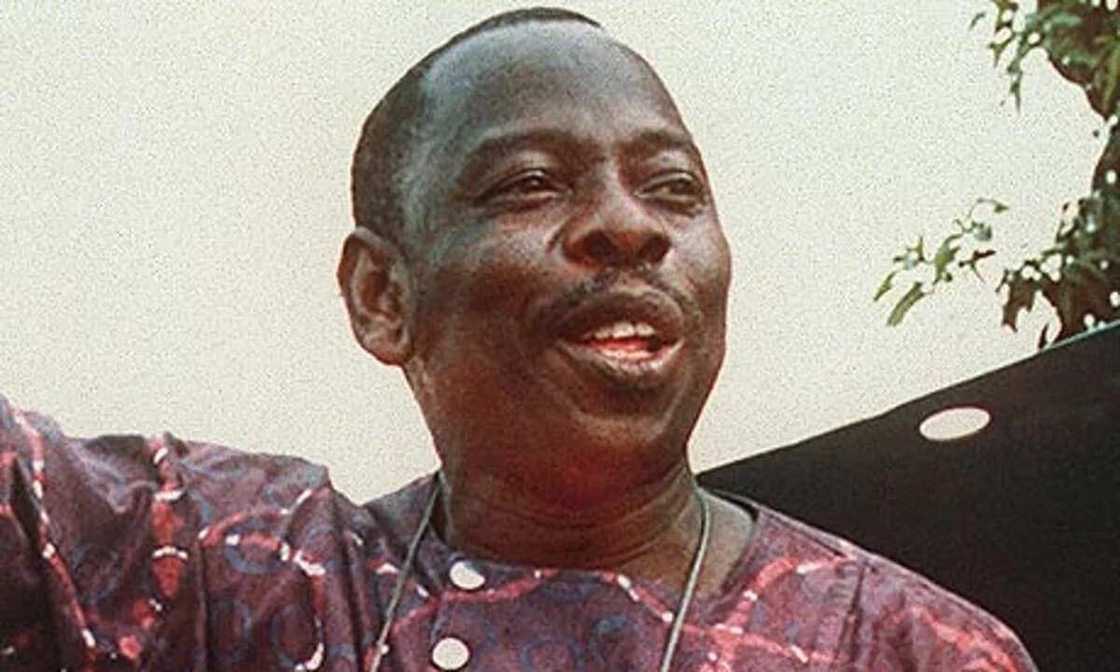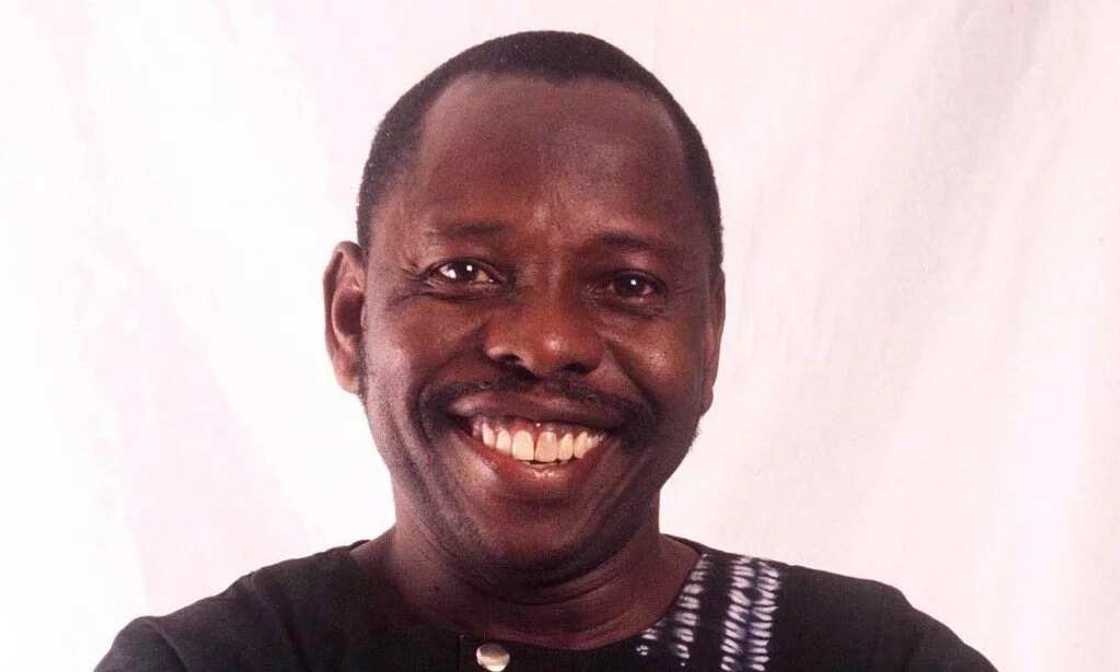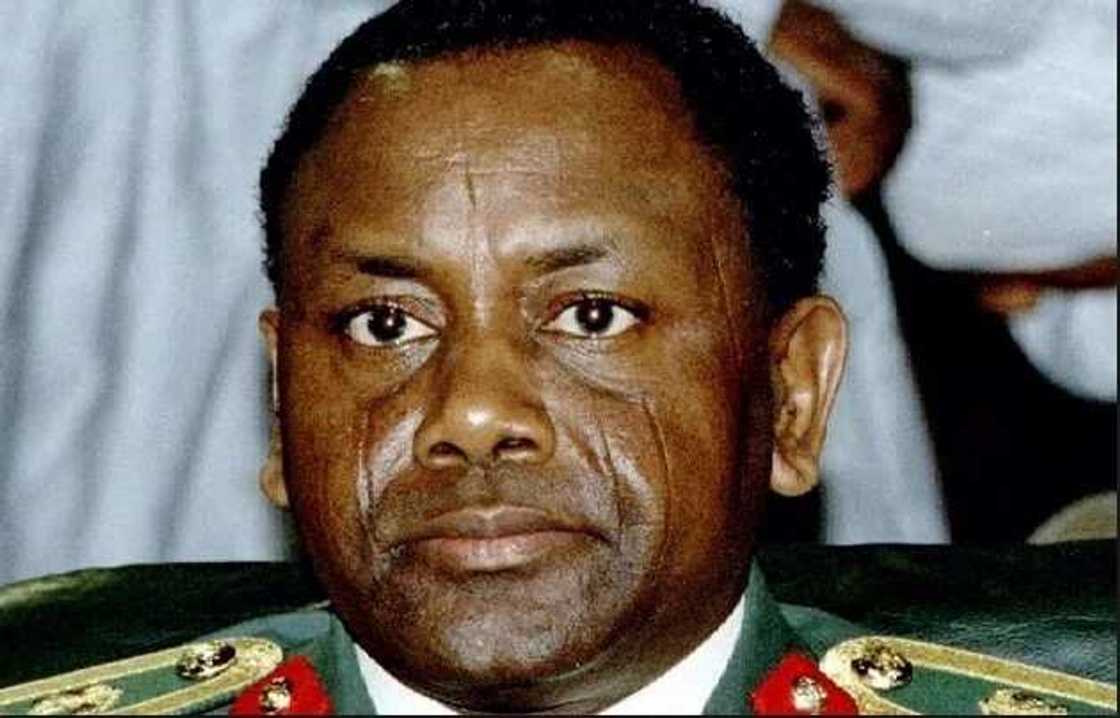The activism of Ken Saro Wiwa and how the military government murdered him by hanging in 1995
- Ken Saro Wiwa was a Niger delta activist but fought actively for the emancipation of his Ogoni people in Rivers state
- His campaign for the liberation of his people was unbearable to the then military government of Nigeria
- He was arrested and sentenced to death by hanging by the administration of General Sani Abacha on November 10, 1995
Born to Jim Wiwa, a forest ranger and his third wife, Widu in Bori, Ogoniland on October 10, 1941, his birth name was Kenule Tsaro-Wiwa but was later changed to Saro Wiwa after the Nigerian civil war. With a brain for education, he got his primary education at a native authority school in his hometown Bori, and attended secondary school at Government College Umuahia where he was captain of the table tennis team. From his young days, he repeatedly won prizes for his proficiency in English and History.
He subsequently proceeded to study English at the Premiere University of Ibadan on scholarship, and plunged himself into different academic and cultural interests. He worked for a drama troupe which had performances in Kano, Benin, Ilorin and Lagos and collaborated with the Nottingham Playhouse theatre group that included a young Judi Dench.
He briefly became a teaching assistant at the University of Lagos and later at University of Nigeria, Nsukka. Saro-Wiwa was an African literature lecturer in Nsukka when the civil war broke out, he supported the federal government and had to leave the region for his hometown of Bori. On his journey to Port-Harcourt, he witnessed the multitudes of refugees returning to the East, and was so moved that he described it as a "sorry sight to see."

Three days after his arrival, nearby Bonny was liberated by federal troops. He and his family then stayed in Bonny, he traveled back to Lagos and took a position at UNILAG which did not last long as he was called back to Bonny to become the civilian administrator for the port city of Bonny in the Niger Delta. At the same time, he combined this job with his appointment as a commissioner in the old Rivers state.
READ ALSO: Osinbajo hosts Buhari's son, top government officials for Eid-el-Fitr celebration (Photos)
It is believed that most of his experiences he put into writing. His best known novel, Sozaboy: A Novel in Rotten English, tells the story of a naive village boy recruited to the army during the Nigerian civil war of 1967 to 1970, and intimates the political corruption and patronage in Nigeria's military regime of the time. Saro-Wiwa's war diaries, On a Darkling Plain, documented his experience during the war. He was also a successful businessman and television producer. His satirical television series, Basi & Company, was wildly popular, with an estimated audience of 30 million.
Saro-Wiwa's works include TV, drama and prose writing. His earlier works from 1970s to 1980s are mostly satirical displays that portray a counter-image of Nigerian society but his later writings were more inspired by political dimensions such as environmental and social justice than satire. Transistor Radio, one of his best known plays was written for a revue during his university days at Ibadan but still resonated well with Nigerian society and was adapted into a television series. Some of his works drew inspiration from the play.
In the early 1970s, Saro-Wiwa served as the regional commissioner for education in the Rivers state cabinet, but was dismissed in 1973 because of his support for Ogoni autonomy. In the late 1970s, he established a number of successful business ventures in retail and real estate, and by the 1980s his focus was primarily on his writing, journalism and television production. It wasn’t until 1977 that he became involved in the politics as the candidate to represent Ogoni in the constituent assembly, an election which he narrowly lost.

By the beginning of the last decade of the 2oth century, Saro Wiwa started devoting most of his time to human rights and environmental causes, particularly in Ogoniland.
He was one of the earliest members of the Movement for the Survival of the Ogoni People (MOSOP), which advocated for the rights of the Ogoni people and particularly struggled against the degradation of Ogoni lands by Royal Dutch Shell. The Ogoni Bill of Rights, written by MOSOP, set out the movement's demands, including increased autonomy for the Ogoni people, a fair share of the proceeds of oil extraction, and remediation of environmental damage to Ogoni lands.
Saro-Wiwa was vice chair of the Unrepresented Nations and Peoples Organization (UNPO) General Assembly from 1993 to 1995. UNPO is an international, non-violent, and democratic organisation (of which MOSOP is a member). Its members were indigenous peoples, minorities, and unrecognised or occupied territories who joined together to protect and promote their human and cultural rights, to preserve their environments and to find non-violent solutions to conflicts which affect them.
READ ALSO: BREAKING: House on the Rock in Abuja goes up in flame
As expected, this stance did not place him in the good books of the government, especially since it was a military government. In 1992, Saro-Wiwa was imprisoned for several months, without trial, by the Nigerian military government. In January 1993, MOSOP organised peaceful marches of around 300,000 Ogoni people, more than half of the Ogoni population, through four Ogoni urban centres, drawing international attention to their people's plight.
Saro-Wiwa was arrested again and detained by Nigerian authorities in June 1993 but was released after a month. On 21 May 1994, four Ogoni chiefs (all on the conservative side of a schism within MOSOP over strategy) were brutally murdered.
Even though Saro-Wiwa had been denied entry to Ogoniland on the day of the murders, he was arrested along with eight other MOSOP leaders and accused of having a hand in it. They denied the charges but was still imprisoned for over a year before being found guilty and sentenced to death by a specially convened tribunal.
Some of their lawyers resigned in protest against the alleged manipulation of the trial by the Abacha regime. The resignations left the defendants to their own means against the tribunal, which continued to bring witnesses to testify against Saro-Wiwa and his peers.
Many of these supposed witnesses later admitted that they had been bribed by the Nigerian government to support the criminal allegations. At least two witnesses who testified that Saro-Wiwa was involved in the murders of the Ogoni elders later recanted, stating that they had been bribed with money and offers of jobs with Shell to give false testimony, in the presence of Shell's lawyer.

On 10 November 1995, Saro-Wiwa and the rest of the Ogoni nine were killed by hanging by military personnel. They were buried in Port Harcourt cemetery. The trial was widely criticized by human rights organisations and, half a year later, Ken Saro-Wiwa received the Right Livelihood Award for his courage, as well as the Goldman Environmental Prize.
Their execution led to Nigeria’s suspension from the Commonwealth of Nations, which lasted for over three years. The Royal Dutch Shell and Brain Anderson, Head of its Nigeria Operations, were believed to have connived with the military government on Saro-Wiwa’s trial and execution.
PAY ATTENTION: install our latest app for Android, read best news on Nigeria’s #1 news app
Beginning in 1996, the Center for Constitutional Rights (CCR), Earth Rights International (ERI), Paul Hoffman of Schonbrun, DeSimone, Seplow, Harris & Hoffman and other human rights attorneys have brought a series of cases to hold Shell accountable for alleged human rights violations in Nigeria, including summary execution, crimes against humanity, torture, inhumane treatment and arbitrary arrest and detention.
The company denied the allegations, despite testimonies stating otherwise, but it agreed a $15.5 million out-of-court settlement in favour of the families of the victims in 2009, saying that the payment was not a concession of guilt, but a gesture for peace.
Recalling his death, his son Kenule Bornale Saro-Wiwa, writer and journalist, recalled the tragic event thus: “On the day they killed him I remember walking up a hilly street in Auckland. I was 25 years old and had flown to New Zealand to try to lobby the Commonwealth heads of state to intervene on behalf of my father, who had been sentenced to death at the end of October. At the top of the street I turned to view the sunset.
“Looking out over the city centre below me and out into the harbour in the distance, I watched the sun sink into the sea, casting a pale orange glow against the sky. I remember the exact moment he died. I was sitting in a restaurant chatting and laughing with friends when I felt a brief palpitation in my chest, it felt like a vital connection had been ruptured inside me and I just knew. It was midnight in Auckland and midday in Nigeria and my father had just been hanged; his broken body lay in a shallow sand pit in a hut at the condemned prisoners block at Port Harcourt prison.”
Sadly, most of the things for which he fought and died, his people are yet to fully enjoy as there is still a lot to be done in terms of environmental clean-up, and providing of facilities for the indigenes of Ogoniland.
Watch this Legit.ng video
Source: Legit.ng

